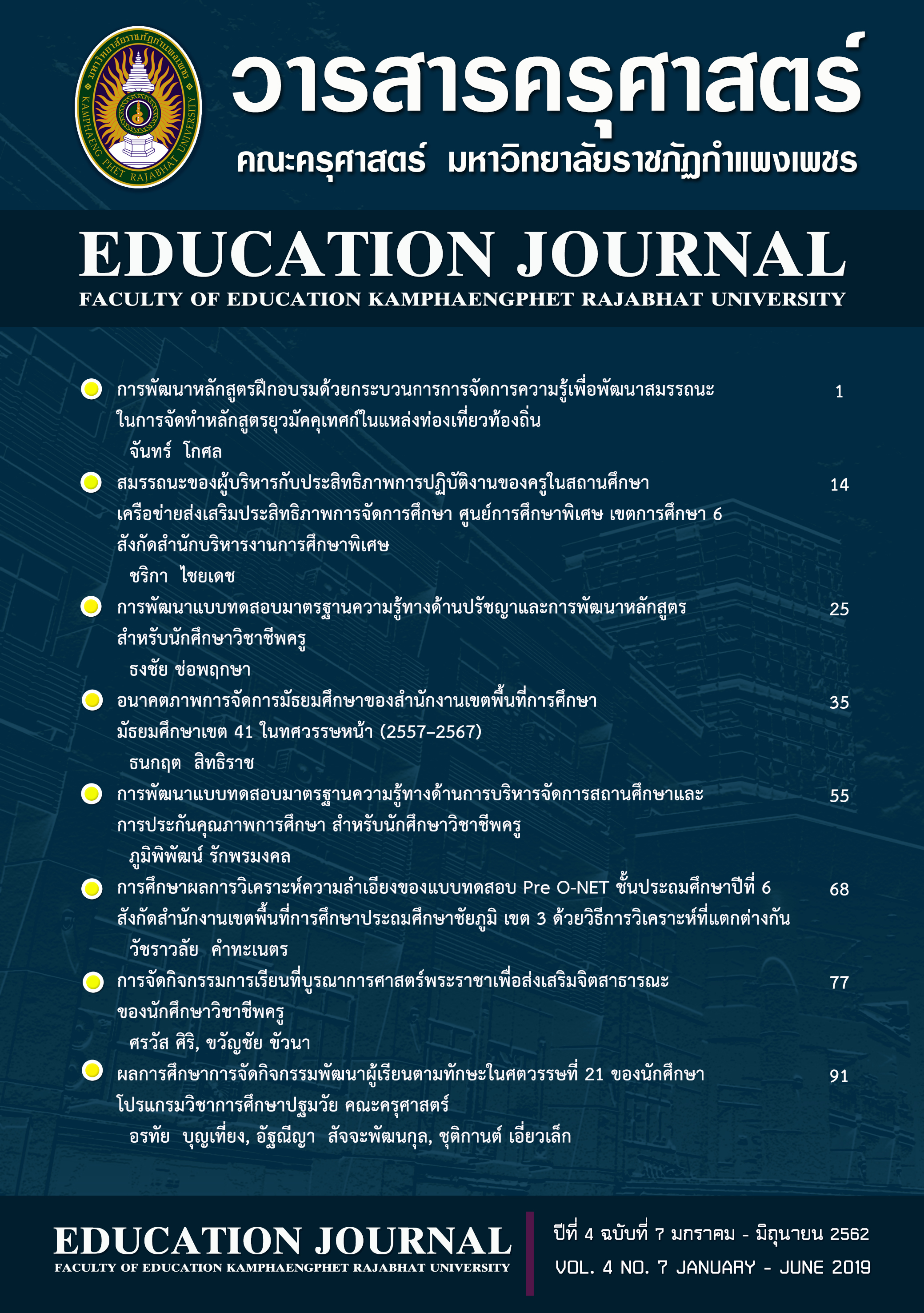THE SCENARIOS OF ADMINISTRATION OF SECONDARY EDUCATION IN THE SECONDARY EDUCATIONAL SERVICE AREA OFFICE 41 IN THE NEXT DECADES (2557–2567)
Main Article Content
Abstract
The Scenarios of Administration of secondary Education in The Secondary Educational service Area Office 41 in the next Decades (2557 – 2567). The research was conducted in 2 steps 1) to study the current conditions and the problems of secondary Education in The Secondary Educational service Area Office 41 in the next Decades (2557 – 2567). The EDFR technique (Ethnographic Delphi Futures Research) was employed by interviewing 20 experts in education concerning the current conditions and problems of secondary education in The Secondary Educational service Area Office 41 in the next Decades (2557 – 2567). 2) Data in step 1) ware formulated for the scenarios of the secondary conditions in the next two decades by the same group of experts in step 1) employed the Delphi technique for consensus of the experts’ opinion in 2 rounds The finding of the research concluded that 1) The current conditions and problems of secondary Education in The Secondary Educational service Area Office 41 in the next Decades (2557 – 2567) of 7 aspects namely: the curriculum, the administration, teaching personnel, school physical environment, teaching and
learning process, teaching medias and the desirable characteristics of the student. 2) The scenarios of Thai secondary education administration in the next two decades would be: changing curriculum to the needs and interest of the students
with the contents though digital electronic equipment, good administration with school principals’ leadership and decentralized administration to school, teachers’ ethics and technological knowledge, good physical environment of school, teaching and learning process to improve student’ critical thinking by using ON-LINE information communication technology (ICT) and the desirable characteristics of the students were analytical, problem-solving, cooperative as global population.
Article Details

This work is licensed under a Creative Commons Attribution-NonCommercial 4.0 International License.
CC Attribution-NonCommercial-NoDerivatives 4.0
References
กรมวิชาการ. (2546). พระราชบัญญัติการศึกษาแห่งชาติ พ.ศ. 2542 และที่แก้ไขเพิ่มเติม (ฉบับที่ 2) พ.ศ. 2545. กรุงเทพฯ: โรงพิมพ์อักษรไทย.
เกษม วัฒนชัย. (2545). การปฏิรูปการเรียนรู้. อนุสารอุดมศึกษา, 27(279), 13-15.
จิรายุ อิศรางกูร ณ อยุธยา และปรียานุช พิบูลสราวุธ. (2552). ตามรอยพ่อ ชีวิตพอเพียงสู่การพัฒนาที่ยั่งยืน. กรุงเทพฯ: ศูนย์การพิมพ์เพชรรุ่ง.
ดวงกมล สินเพ็ง. (2553). การพัฒนาผู้เรียนสู่สังคมแห่งการเรียนรู้: การจัดการเรียนการสอนที่เน้นผู้เรียนเป็นศูนย์กลาง. กรุงเทพฯ: จุฬาลงกรณ์มหาวิทยาลัย.
ธเนศ ขำเกิด. (ม.ป.ป.). การจัดบรรยากาศและสิ่งแวดล้อมที่ดีในโรงเรียน. สืบค้นเมื่อวันที่ 16 มกราคม 2556 จาwww.nan2.go.th/UserFiles/File/best.doc.
เนาวนิตย์ สงคราม. (2556). การสร้างนวัตกรรมเปลี่ยนผู้เรียนให้เป็นผู้สร้างนวัตกรรม.กรุงเทพฯ : จุฬาลงกรณ์มหาวิทยาลัย.
บุญชม ศรีสะอาด. (2554). การวิจัยเบื้องต้น. (พิมพ์ครั้งที่ 9). กรุงเทพฯ: สุวีรียสาส์น.
บุญเลี้ยง ทุมทอง. (2556). การพัฒนาหลักสูตร. (พิมพ์ครั้งที่ 4). กรุงเทพฯ: แอคทีฟ พริ้น.
ปรัชญา เวสารัชช์. (2545). หลักการจัดการศึกษา. กรุงเทพฯ: ภาพพิมพ์.
ไพฑูรย์ สินลารัตน์ และคณะ. (2554). สัตตสิกขาทัศน์ เจ็ดมุมมองการศึกษาใหม่และการเรียนการสอนนอกกรอบ 7 ประการ. กรุงเทพฯ: มหาวิทยาลัยธุรกิจบัณฑิต.
ไพฑูรย์ สินลารัตน์ และคณะ. (2557). โรงเรียนสร้างสรรค์ :นวทัศน์สู่การปฏิบัติ. กรุงเทพฯ: มหาวิทยาลัยธุรกิจบัณฑิต.
มหาวิทยาลัยสุโขทัยธรรมาธิราช. (2537). ประมวลสาระชุดวิชา สัมมนาการมัธยมศึกษา หน่วยที่ 7-10. กรุงเทพฯ: มหาวิทยาลัยสุโขทัยธรรมาธิราช.
ยุทธ ไกยวรรณ์. (2545). พื้นฐานการวิจัย. กรุงเทพฯ : สุวิริยาสาส์น.
รุ่ง แก้วแดง. (2543). ปฏิวัติการศึกษาไทย. (พิมพ์ครั้งที่ 8). กรุงเทพฯ: มติชน.
สยามธุรกิจ. (2553). การศึกษาในอนาคต, สืบค้นเมื่อวันที่ 20 ธันวาคม 2554 จาก http://www.siamturakij.com/home/news/display_news.php?news_id=413342210.
สำนักงานคณะกรรมการการศึกษาขั้นพื้นฐาน. (2553). แนวทางการดำเนินงานโรงเรียนมาตรฐานสากล WORLD-CLASS STANDARD SCHOOL. กรุงเทพฯ: โรงพิมพ์ชุมนุมสหกรณ์การเกษตรแห่งประเทศไทย.
สุชาติ สุขราช. (2555). คุณลักษณะพึงประสงค์ของผู้เรียนในศตวรรษที่ 21. สืบค้นเมื่อวันที่ 16 มกราคม 2556 จาก http://www.gotoknow.org/posts/513823.
สุเทพ พงศ์ศรีวัฒน์. (2547). ภาวะผู้นำ. เชียงราย: สถาบันราชภัฏเชียงราย.
สุพินดา ณ มหาไชย. (3 พฤษภาคม 2556). คมชัดลึกออนไลน์. สืบค้นเมื่อวันที่ 10 กรกฎาคม 2556 จาก, http://www.komchadluek.net/detail/20130503/157502/FlippedClassroom.


